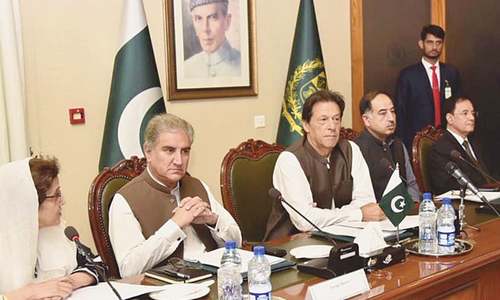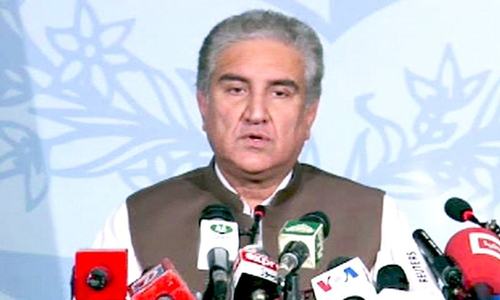ISLAMABAD: The Foreign Office (FO) has stepped back from a row with the US State Department over the readout of Prime Minister Imran Khan’s telephonic conversation with US Secretary of State Mike Pompeo.
“We would want the episode to end… politically, we need to move on,” FO spokesman Dr Muhammad Faisal said at the weekly media briefing, commenting on the controversy that erupted after Mr Pompeo called the prime minister to congratulate him on assuming the office.
At one point, the dispute looked serious enough to impact the upcoming visit of Mr Pompeo, who is scheduled to make a stopover in Islamabad along with US Chairman Joint Chiefs of Staff Gen Joseph Dunford on Sept 5, while on his way to India for the first round of the India-US dialogue.
It is believed that the government has decided to end the controversy so that the visit of Mr Pompeo could be more productive. But, there are also rumours that the FO conceded its position on the matter after the US shared the transcript of the conversation, debunking the Pakistani assertion that the readout was inaccurate — something Foreign Minister Shah Mehmood Qureshi had repeatedly said both in public and on the floor of the Senate.
Foreign minister earlier said that US account of conversation was ‘contrary to reality’
Mr Qureshi, had during his speech in the Senate on Tuesday, dropped a hint that Pakistan was not intending to press the matter any further by saying that “mistakes are made and it could have been made.”
Despite the anti-American rhetoric it had adopted when it was in the opposition, the Pakistan Tehreek-i-Insaf after forming government looks quite keen to engage with the United States. The Americans, meanwhile, have lived with the relationship — despite the many setbacks it has been rocked by — because Washington feels Islamabad is integral to its regional policy.
The Trump administration has, however, continued to engage at a slower pace in an attempt to retain pressure on Pakistan. Mr Pompeo’s visit, which is reminiscent of Clinton’s short stay in Islamabad en route to Delhi, is an example of these damper ties between the two states. The Americans will follow up their short visit with a longer one in Delhi, where they intend to operationalise India’s status as a major defence partner.
A senior Pakistani diplomat, in a conversation with Dawn, conceded that it would be a mistake to think that he [Pompeo] is coming on a goodwill trip. The Americans, he said, are using the rationale that they are here to meet the new government in Islamabad, but we must not, he said, expect that our relationship will drastically improve.
Joint drills
The FO also defended the participation of Pakistani troops in joint military exercises with India under the umbrella of the Shanghai Cooperation Organization (SCO). “As a member of this important organization, Pakistan is open to collaborating with all other member states when it comes counter-terrorism. Pakistan believes that cooperation amongst member states will further boost the SCO’s vision of regional peace, stability and development within the ambit of the organization and beyond,” Dr Faisal said.
The joint exercise titled “Peace Mission 2018” was conducted by the Central Military Commission of Russia at Chebarkul, in the Ural Mountains of Russia from Aug 22 to 29, within the framework of the SCO. Around 3,000 soldiers from China, Russia, Kazakhstan, Tajikistan, Kyrgyzstan, India and Pakistan took part in the drills, which were aimed at enhancing tactical level cooperation among member countries for countering terrorism.
Responding to a question about the ‘Kartarpura Corridor,’ Dr Faisal said that Pakistan is working to narrow the trust deficit with India and plans to open Kartarpura corridor as one of the initiatives to achieve it. He, however, cautioned that “it cannot be considered in isolation.”
Indian politician and former Indian cricketer Navjot Sidhu, who came to attend the prime minister’s oath ceremony, had after returning to India, disclosed that Pakistan was pondering over opening the Kartarpura Corridor on the 550th birthday of Baba Guru Nanak.
Pakistan and India, had in 1988, agreed to construct a corridor from Dera Baba Nanak — in India — to Kartarpura Sahib in Pakistan. Both places of holy significance to the Sikh community, are only four kilometres apart, but tense relations between the two countries has so far prevented progress on the plan. The corridor would enable the Sikh pilgrims to visit Gurdwara Kartarpura Sahib in Pakistan without a visa or a passport.
In the absence of the corridor Sikh devotees gather near the border fence and offer prayers with Gurdwara Kartarpura Sahib in sight with some of them even using binoculars to better view the temple.
Published in Dawn, August 31st, 2018













































